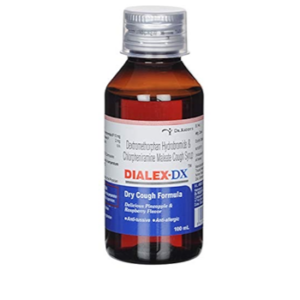CHLORPHENIRAMINE + DEXTROMETHORPHAN + COUGH EXPECTORANT
Chlorpheniramine: Chlorpheniramine is an antihistamine medication that is commonly used to relieve symptoms of allergic conditions such as hay fever, hives, and allergy-related itching. It is available in various formulations, including tablets, capsules, syrup, and nasal sprays.
The mechanism of action of chlorpheniramine involves blocking the effects of histamine, a chemical that is released by the body during an allergic reaction. By blocking the histamine receptors, chlorpheniramine helps to alleviate symptoms like sneezing, runny nose, itchy/watery eyes, and itching of the skin.
The dosage of chlorpheniramine depends on the formulation and the individual’s age and condition. The recommended dose for adults is typically 4 mg to 8 mg every 4-6 hours, not exceeding 32 mg within 24 hours. For children, the dose is based on their age and weight and should be determined by a healthcare professional.
Chlorpheniramine can cause a range of side effects, although not everyone experiences them. Common side effects may include drowsiness, dizziness, dry mouth, blurred vision, constipation, and difficulty urinating. These side effects are usually mild and temporary. However, in rare cases, more serious side effects may occur, such as rapid or irregular heartbeat, hallucinations, seizures, or allergic reactions. If any severe side effects occur, immediate medical attention should be sought.
It is important to note that chlorpheniramine can cause drowsiness, so individuals taking this medication should avoid activities that require mental alertness, such as driving or operating heavy machinery.
As with any medication, it is advisable to consult a healthcare professional or pharmacist before starting or changing the dose of chlorpheniramine. They can provide personalized recommendations based on an individual’s specific medical history and other medications they may be taking.
Dextromethorphan: Dextromethorphan is a medication commonly used as a cough suppressant. It is available in both over-the-counter cough syrups and in prescription medications.
The mechanism of action of dextromethorphan is not fully understood, but it is believed to work by inhibiting the cough reflex in the brain. It acts on the cough center in the medulla oblongata, suppressing the urge to cough.
The recommended dose of dextromethorphan depends on the formulation and strength of the medication. For over-the-counter cough syrups, the usual adult dose is 10-30 mg every 4-6 hours, while the maximum daily dose should not exceed 120 mg. It is important to carefully follow the instructions on the product label or as prescribed by a healthcare provider.
Common side effects of dextromethorphan may include dizziness, drowsiness, nausea, vomiting, and stomach upset. These side effects are usually mild and temporary. In rare cases, dextromethorphan can cause more serious side effects such as allergic reactions, hallucinations, confusion, difficulty urinating, and irregular heart rhythms. It is important to seek medical attention if any of these severe side effects occur.
It is worth noting that dextromethorphan can interact with other medications, including certain antidepressants and monoamine oxidase inhibitors (MAOIs), leading to potentially dangerous side effects. It is advisable to inform healthcare providers about all medications being taken before using dextromethorphan.
Overall, dextromethorphan is considered an effective and well-tolerated option for temporary relief of cough symptoms. However, it is important to use it only as directed and consult a healthcare provider if symptoms persist or worsen.
Cough Expectorant: Cough expectorants are medications used to help expel mucus and phlegm from the respiratory tract. They work by thinning and loosening the mucus, making it easier for the body to clear it out through coughing.
The main active ingredient in cough expectorants is usually guaifenesin, which is a medication that helps to increase the volume and hydration of respiratory tract fluids. Guaifenesin works by reducing the viscosity of mucus, making it less sticky and allowing it to be coughed up more easily.
Cough expectorants are commonly used for conditions such as chronic bronchitis, chest congestion associated with the common cold, and other respiratory infections where there is a buildup of mucus in the airways.
The typical recommended dose of cough expectorants containing guaifenesin is 200-400 mg orally every four hours as needed, with a maximum daily dose of 2400 mg. It is important to follow the recommended dosage instructions on the specific product you are using or as advised by a healthcare professional.
Common side effects of cough expectorants may include nausea, vomiting, dizziness, drowsiness, headache, and rash. These side effects are usually mild and resolve on their own. However, if any severe side effects occur, such as difficulty breathing or swelling of the face, lips, or throat, it is important to seek immediate medical attention.
It is worth noting that cough expectorants may not be suitable for everyone, and it is advised to consult with a healthcare professional or pharmacist before using them, especially for individuals with certain medical conditions or taking other medications that could interact with guaifenesin.
Overall, cough expectorants containing guaifenesin are commonly used to help relieve coughs and congestion associated with respiratory conditions, and their mechanism of action involves thinning and loosening mucus to make it easier to cough up.

